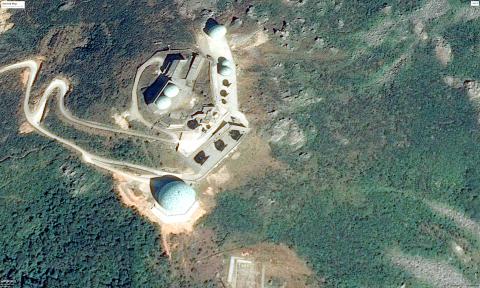China has installed new aerial listening stations on the coast of its Fujian Province, a military spokesman said yesterday, adding that measures are being taken to counter surveillance and enhance the security of important electronic communications.
Ministry of National Defense spokesperson Major General David Lo (羅紹和) said the military is monitoring the development closely and that Taiwan has its own surveillance system to deal with intelligence gathering by Chinese signal-snooping stations.
The statement came one day after the Canada-based Kanwa Information Center reported that the Chinese People’s Liberation Army (PLA) had set up at least three large aerial listening stations, directly across the Strait from Taiwan.

Photo: CNA, provided by Kanwa Information Center
Lo said that the ministry has instructed its telecommunications units to strictly follow established regulations on frequency signals and radio data encryption to ensure the security of classified information.
According to Kanwa, the PLA has been installing new facilities in Fujian to monitor telecommunications and radio signals, including mobile phones and other types of wireless communications, from military bases and government institutions across the nation’s western region.
One new monitoring station is reportedly only about 23km from the PLA’s Longtian Air Base, where S-300 PMU-2 surface-to-air missiles are deployed. All the antennae and radar dishes at the base are directed toward Taipei and Greater Taichung, Kanwa reported.
Two other new Fujian bases have installed radomes and antennae to intercept electromagnetic waves from Taiwan’s military radar systems, as well as other telecommunications and radio signals, the report said.
It is known that the stations are administered by the Third Department and Fourth Department of the PLA’s General Staff Department, which are responsible for “technical reconnaissance” and cyberwarfare, monitoring telecommunications traffic, electronic countermeasures and radar intelligence-gathering.
A satellite photograph in the Kanwa report shows that the monitoring station near Longtian Air Base has 10 parabolic radar antennae of various sizes, and six large radomes — a weatherproof enclosure that protects a radar antenna inside it.
According to a defense expert in Taiwan, the station is a signals intelligence base established in 1952 that has been upgraded.

INVESTIGATION: The case is the latest instance of a DPP figure being implicated in an espionage network accused of allegedly leaking information to Chinese intelligence Democratic Progressive Party (DPP) member Ho Jen-chieh (何仁傑) was detained and held incommunicado yesterday on suspicion of spying for China during his tenure as assistant to then-minister of foreign affairs Joseph Wu (吳釗燮). The Taipei District Prosecutors’ Office said Ho was implicated during its investigation into alleged spying activities by former Presidential Office consultant Wu Shang-yu (吳尚雨). Prosecutors said there is reason to believe Ho breached the National Security Act (國家安全法) by leaking classified Ministry of Foreign Affairs information to Chinese intelligence. Following interrogation, prosecutors petitioned the Taipei District Court to detain Ho, citing concerns over potential collusion or tampering of evidence. The

‘FORM OF PROTEST’: The German Institute Taipei said it was ‘shocked’ to see Nazi symbolism used in connection with political aims as it condemned the incident Sung Chien-liang (宋建樑), who led efforts to recall Democratic Progressive Party (DPP) Legislator Lee Kun-cheng (李坤城), was released on bail of NT$80,000 yesterday amid an outcry over a Nazi armband he wore to questioning the night before. Sung arrived at the New Taipei City District Prosecutors’ Office for questioning in a recall petition forgery case on Tuesday night wearing a red armband bearing a swastika, carrying a copy of Adolf Hitler’s Mein Kampf and giving a Nazi salute. Sung left the building at 1:15am without the armband and apparently covering the book with a coat. This is a serious international scandal and Chinese

Seventy percent of middle and elementary schools now conduct English classes entirely in English, the Ministry of Education said, as it encourages schools nationwide to adopt this practice Minister of Education (MOE) Cheng Ying-yao (鄭英耀) is scheduled to present a report on the government’s bilingual education policy to the Legislative Yuan’s Education and Culture Committee today. The report would outline strategies aimed at expanding access to education, reducing regional disparities and improving talent cultivation. Implementation of bilingual education policies has varied across local governments, occasionally drawing public criticism. For example, some schools have required teachers of non-English subjects to pass English proficiency

TRADE: The premier pledged safeguards on ‘Made in Taiwan’ labeling, anti-dumping measures and stricter export controls to strengthen its position in trade talks Products labeled “made in Taiwan” must be genuinely made in Taiwan, Premier Cho Jung-tai (卓榮泰) said yesterday, vowing to enforce strict safeguards against “origin laundering” and initiate anti-dumping investigations to prevent China dumping its products in Taiwan. Cho made the remarks in a discussion session with representatives from industries in Kaohsiung. In response to the US government’s recent announcement of “reciprocal” tariffs on its trading partners, President William Lai (賴清德) and Cho last week began a series of consultations with industry leaders nationwide to gather feedback and address concerns. Taiwanese and US officials held a videoconference on Friday evening to discuss the